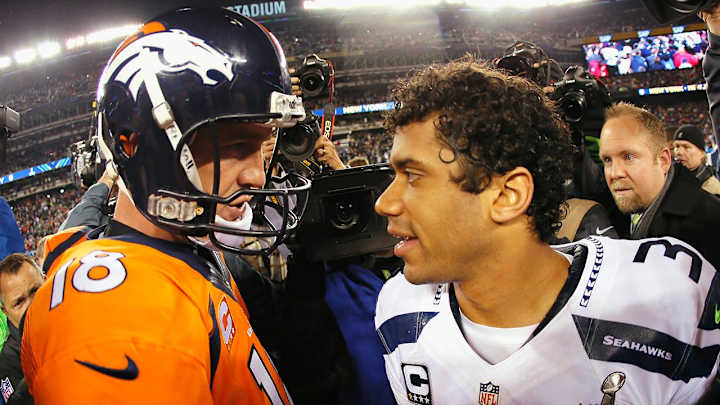Broncos’ Trade for Russell Wilson Echoes of Peyton Manning’s Move to Mile High

Internally, the Broncos felt like the situation they were going to present to a quarterback in 2022 wasn’t dissimilar from what they put in front of Peyton Manning in ’12.
They found a buyer in Russell Wilson, and he wasn’t the only one interested.
Over the weekend, rumblings emerged in Indianapolis that Aaron Rodgers, Deshaun Watson and Wilson all had Denver high on their lists, with Rodgers and Wilson considering it the top option if they weren’t to stay with their own teams. So when Rodgers made official what the Packers expected for a few days, if not weeks—that they’d keep their quarterback in 2022—the path was cleared for Denver to complete its deal for Wilson.
And that 2012 parallel? There’s a reason why Broncos GM George Paton didn’t even remotely try to blow up the roster he inherited upon taking the Denver job a year ago, and it’s the same reason the team passed on a quarterback it really liked, Ohio State’s Justin Fields, in the ’21 draft. The situation Paton walked into wasn’t broken, and it’s better now than it was then.
So here’s how you can line it up for Wilson, as he goes from the NFC West to the AFC West.
• In 2012, the Broncos had a number of ascending young skill players (Demaryius Thomas, Eric Decker, Julius Thomas). The ’22 team has a similar arsenal (Jerry Jeudy, Courtland Sutton, Tim Patrick, K.J. Hamler, Albert Okwuegbunam, Javonte Williams).
• The 2012 Broncos had cornerstones on their offensive line (Ryan Clady, Chris Kuper), as does the ’22 team (Garrett Bolles, Dalton Risner).
• 2012 Denver had a young premier edge rusher (Von Miller) and corner (Chris Harris), and the ’22 squad does, too (Bradley Chubb, Patrick Surtain II).
• Both teams also had innovative young offensive coaches and an infrastructure relatively new to Denver (John Elway and John Fox were hired in 2011, as was Adam Gase to the offensive staff; Paton brought Nathaniel Hackett aboard this year after arriving last year).
You don’t need me to tell you what happened next. Manning unlocked the potential of a team that advanced a round in the playoffs with Tim Tebow at quarterback the year before, quickly helping to make Demaryius Thomas and Decker stars, and Julius Thomas a viable threat at tight end. He also turned Denver into a destination for stars like DeMarcus Ware, Aqib Talib, Wes Welker and Emmanuel Sanders, which in turn opened a four-year championship window that culminated in Manning winning the Super Bowl in his final game.
My guess is, if you asked Paton right now, he’d take four AFC West titles, two trips to the Super Bowl and a championship over the next four years. And what he’s saying with this move isn’t necessarily that he sees that coming, but that anything is possible.
Wilson clearly agrees. He had a level of control here. He has a no-trade clause and a number of teams came to the Seahawks with offers—the Commanders proposed a deal that would send high picks in the next three drafts for Wilson. But my understanding is that Denver topped Wilson’s list from the minute he started thinking about the chance that he wouldn’t be in Seattle next season.
And as for the Seahawks, if we’re being honest, they get what they need here, too. There’d been an acknowledgement with the organization that the contract Wilson signed in 2019 was likely going to be his last in Seattle. With that established, he had two years left on his deal, and the roster was in need of a facelift. Pulling one off without picks (the Seahawks sent this year’s one to the Jets for Jamal Adams) was always going to be tough.
Bottom line, the terms on Wilson’s deal made him more tradable, and Seattle probably wasn’t going to seriously contend before the end of it, so this allows the team to turn the page.
Meanwhile, Wilson gets a new team that’s got realistic aspirations that match his own.
Now, we get to see if Paton and the Broncos were right on what they were trying to sell. And if Wilson’s right on what he’s buying.
More NFL Coverage:
• Relationships Are the Reason Rodgers Is Returning to the Packers
• Aaron Rodgers Just Showed All Quarterbacks How to Win a Power Struggle
• Packers’ Super Bowl Future Odds Jump With Aaron Rodgers Returning
• Fantasy Impact of Aaron Rodgers’s Return to Green Bay

Albert Breer is a senior writer covering the NFL for Sports Illustrated, delivering the biggest stories and breaking news from across the league. He has been on the NFL beat since 2005 and joined SI in 2016. Breer began his career covering the New England Patriots for the MetroWest Daily News and the Boston Herald from 2005 to '07, then covered the Dallas Cowboys for the Dallas Morning News from 2007 to '08. He worked for The Sporting News from 2008 to '09 before returning to Massachusetts as The Boston Globe's national NFL writer in 2009. From 2010 to 2016, Breer served as a national reporter for NFL Network. In addition to his work at Sports Illustrated, Breer regularly appears on NBC Sports Boston, 98.5 The Sports Hub in Boston, FS1 with Colin Cowherd, The Rich Eisen Show and The Dan Patrick Show. A 2002 graduate of Ohio State, Breer lives near Boston with his wife, a cardiac ICU nurse at Boston Children's Hospital, and their three children.
Follow AlbertBreer